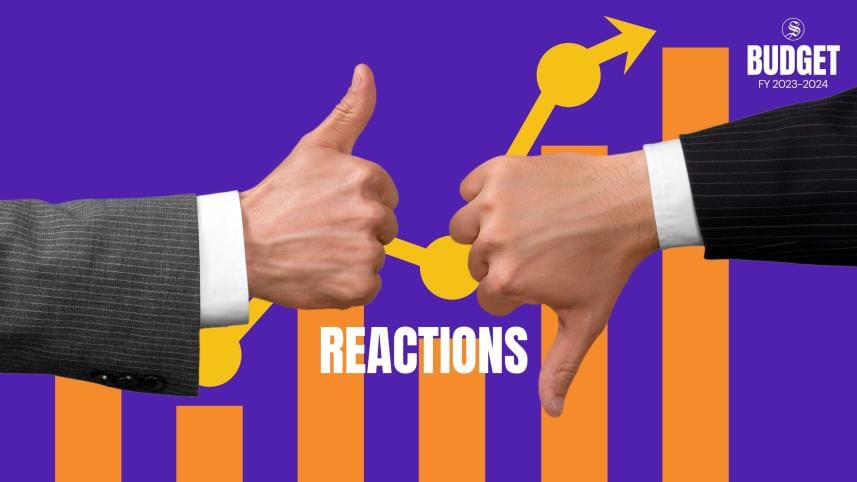Trade bodies give mixed reactions

Chamber and trade body leaders yesterday expressed mixed reactions to the proposed national budget for fiscal year 2023-24, agreeing with some and disagreed with many others.
Sameer Sattar, president of the Dhaka Chamber of Commerce and Industry, said the budget was big indeed and there was a deficit of Tk 261,785 crore.
But in order to implement such a large budget, a partnership between the National Board of Revenue (NBR) and the private sector is more important to make it effective, he said.
Sattar reiterated a request to reduce corporate tax for non-listed companies by at least 2.5 per cent instead of keeping it unchanged.
The government's target to borrow Tk 1,32,395 crore from the banking sector will hamper private sector credit flow, he added.
However, tariff and VAT on the import of 13 petroleum and related products have been withdrawn to reduce energy prices which will have a positive impact on the economy, he added.
The Metropolitan Chamber of Commerce and Industry (MCCI) expressed disappointment that there was no proposal to revise a precondition on limiting cash transactions for availing corporate tax.
Considering the fact that 80 per cent of the economy is informal in Bangladesh, such conditions are not compatible, said Saiful Islam, president of the MCCI.
The chamber suggested reducing the rate of tax deducted at source on construction, infrastructure, etc.
Faruque Hassan, president of the Bangladesh Garment Manufacturers and Exporters Association, said the finance minister asked to increase exports in the budget speech but gave no specific guideline.
Exports have decreased due to the current global environment and this year there will be many more challenges to face for which there should have been specific instructions, he said.
Md Jashim Uddin, president of the Federation of Bangladesh Chambers of Commerce and Industry, said meeting the tax collection target could be a big challenge.
Since Bangladesh's foreign currency reserves are dependent on exports and remittances, the country can not exactly pinpoint where the reserves will come to stand at one point in time, he said.
If the two can not be maintained and if the revenue collection target is not achieved, it will be quite difficult to manage the budget, he added.
"Supplementary duty on 234 items has been withdrawn and regulatory tax on 191 items. I don't think that's right. Because then the protection of the local industry decreases," Jashim added.
Syed Ershad Ahmed, president of the American Chamber of Commerce in Bangladesh, said it was a critical issue for developing countries that rely on external borrowing to drive economic growth.
They need to adopt prudent debt management strategies that promote transparency, accountability and fiscal discipline, he said.
Russell T Ahmed, president of the Bangladesh Association of Software and Information Services, expressed concern regarding the increase of import duty on essential software components such as operating systems, databases, development tools, and security software.
In a move that surprised many, the proposed duty has skyrocketed from 5 per cent to a staggering 25 per cent. It is crucial to acknowledge that these software tools are currently unavailable domestically, he said.
There is no new incentive for local industry development in the proposed fiscal budget, rather the government has imposed additional VAT for some local manufacturers, said the Foreign Investors' Chamber of Commerce & Industry (FICCI).
They include at least three -- smartphone manufacturing, software development and customisation, said the FICCI.
The chamber, however, welcomed an increase in the initial threshold of tax-free income for individuals. But considering the high inflationary trend, this may not be adequate, it said.
The proposed budget aimed for a GDP growth of 7.5 per cent and an inflation rate of 6 per cent for the upcoming fiscal year, the targets of which are challenging, according to a press release issued by the FICCI.
However, if the targets are achieved, it will bring momentum to the economy, it said.
The projected Annual Development Programme of Tk 2,63,000 crore is targeted to continue facilitating quick recovery of the economy despite different external challenges, the chamber said.




 For all latest news, follow The Daily Star's Google News channel.
For all latest news, follow The Daily Star's Google News channel.
Comments